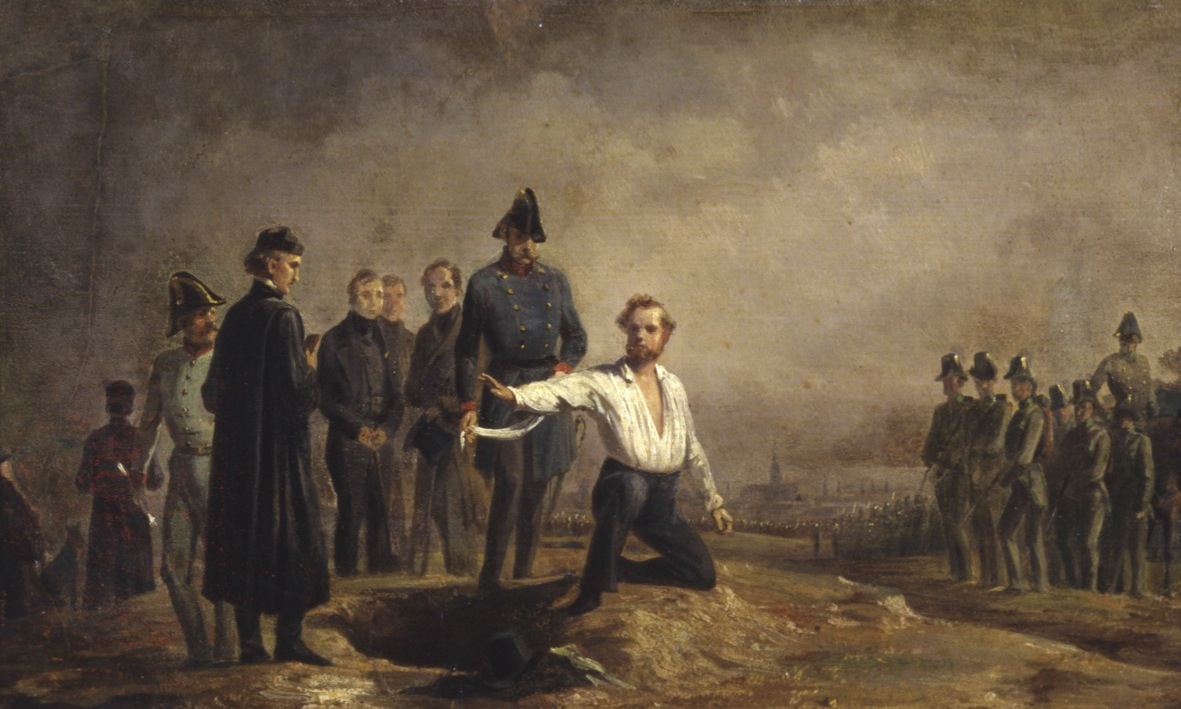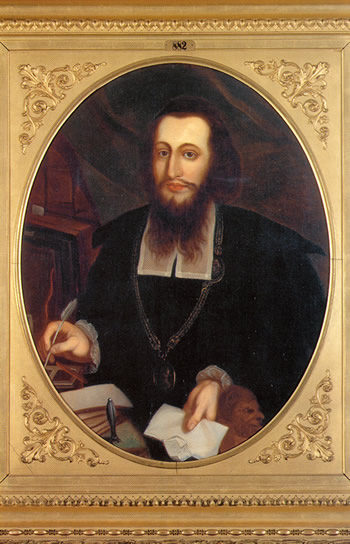|
Hermann Jellinek
Hermann Jellinek (22 January 1822 in Drslavice – 23 November 1848 in Vienna) was a writer, journalist, and revolutionary from a prominent Austrian Jewish family. His older brother Adolf Jellinek was one of Austria-Hungary's leading rabbis and writers. Life He left home at 13 to study at university and gained a doctorate in philosophy from Leipzig University, where he was later expelled. During his education, he abandoned plans to become a rabbi, and became an atheist and liberal radical. Afterward, he moved to Berlin, but was expelled there too for his political activities, and arrived in Vienna in March 1848. In Vienna, Jellinek supported the liberal and anti-Hapsburg revolutionary movements as a journalist. Following the violent repression of the October 1848 Vienna Uprising The Vienna Uprising or October Revolution (german: Wiener Oktoberaufstand, or ) of October 1848 was the last uprising in the Austrian Revolution of 1848. On 6 October 1848, as the troops of the Austrian ... [...More Info...] [...Related Items...] OR: [Wikipedia] [Google] [Baidu] |
Drslavice (Uherské Hradiště District)
Drslavice (german: Derslawitz) is a municipality and village in Uherské Hradiště District in the Zlín Region of the Czech Republic. It has about 500 inhabitants. Drslavice lies approximately east of Uherské Hradiště, south of Zlín, and south-east of Prague. History The first written mention of Drslavice is from 1373. Notable people *Adolf Jellinek Adolf Jellinek ( he, אהרן ילינק ''Aharon Jelinek''; 26 June 1821 in Drslavice, Moravia – 28 December 1893 in Vienna) was an Austrian rabbi and scholar. After filling clerical posts in Leipzig (1845–1856), he became a preacher at t ... (1821–1893), Austrian rabbi and scholar * Hermann Jellinek (1822–1848), Austrian writer, journalist and revolutionary References Villages in Uherské Hradiště District Shtetls {{Jewish-hist-stub ... [...More Info...] [...Related Items...] OR: [Wikipedia] [Google] [Baidu] |
Vienna
en, Viennese , iso_code = AT-9 , registration_plate = W , postal_code_type = Postal code , postal_code = , timezone = CET , utc_offset = +1 , timezone_DST = CEST , utc_offset_DST = +2 , blank_name = Vehicle registration , blank_info = W , blank1_name = GDP , blank1_info = € 96.5 billion (2020) , blank2_name = GDP per capita , blank2_info = € 50,400 (2020) , blank_name_sec1 = HDI (2019) , blank_info_sec1 = 0.947 · 1st of 9 , blank3_name = Seats in the Federal Council , blank3_info = , blank_name_sec2 = GeoTLD , blank_info_sec2 = .wien , website = , footnotes = , image_blank_emblem = Wien logo.svg , blank_emblem_size = Vienna ( ; german: Wien ; ba ... [...More Info...] [...Related Items...] OR: [Wikipedia] [Google] [Baidu] |
Adolf Jellinek
Adolf Jellinek ( he, אהרן ילינק ''Aharon Jelinek''; 26 June 1821 in Drslavice, Moravia – 28 December 1893 in Vienna) was an Austrian rabbi and scholar. After filling clerical posts in Leipzig (1845–1856), he became a preacher at the Leopoldstädter Tempel in Vienna in 1856. Footnotes: ''Jewish Encyclopedia,'' vii. 92-94. For a character sketch of Adolf Jellinek see S. Singer, ''Lectures and Addresses'' (1908), pp. 88–93; Kohut, ''Berühmte israelitische Männer und Frauen.'' Life and work He was associated with the promoters of the Wissenschaft des Judentums, and wrote on the history of the Kabbalah in the tradition of Western scholarship. Jellinek is also known for his work in German on Abraham ben Samuel Abulafia, one of the earliest students of Kabbalah who was born in Spain in 1240. Jellinek's bibliographies (each bearing the Hebrew title ''Qontres'') were useful compilations, but his most important work lay in three other directions: midrashic, psychol ... [...More Info...] [...Related Items...] OR: [Wikipedia] [Google] [Baidu] |
Leipzig University
Leipzig University (german: Universität Leipzig), in Leipzig in Saxony, Germany, is one of the world's oldest universities and the second-oldest university (by consecutive years of existence) in Germany. The university was founded on 2 December 1409 by Frederick I, Elector of Saxony and his brother William II, Margrave of Meissen, and originally comprised the four scholastic faculties. Since its inception, the university has engaged in teaching and research for over 600 years without interruption. Famous alumni include Gottfried Wilhelm von Leibniz, Johann Wolfgang von Goethe, Leopold von Ranke, Friedrich Nietzsche, Robert Schumann, Richard Wagner, Tycho Brahe, Georgius Agricola, Angela Merkel and ten Nobel laureates associated with the university. History Founding and development until 1900 The university was modelled on the University of Prague, from which the German-speaking faculty members withdrew to Leipzig after the Jan Hus crisis and the Decree of Kutná Hora. ... [...More Info...] [...Related Items...] OR: [Wikipedia] [Google] [Baidu] |
Vienna Uprising
The Vienna Uprising or October Revolution (german: Wiener Oktoberaufstand, or ) of October 1848 was the last uprising in the Austrian Revolution of 1848. On 6 October 1848, as the troops of the Austrian Empire were preparing to leave Vienna to suppress the Hungarian Revolution, a crowd sympathetic to the Hungarian cause (of workers, students and mutinous soldiers) tried to prevent them from leaving. The incident escalated into violent street battles; blood was spilt in Saint Stephen's Cathedral and Count Baillet von Latour, the Austrian Minister of War, was lynched by the crowd. The commander of the Vienna garrison, Count Auersperg, was obliged to evacuate the city, but he entrenched himself in a strong position outside it. On 7 October, Emperor Ferdinand I fled with his court to (now Olomouc, Czech Republic) under the protection of Alfred I, Prince of Windisch-Grätz. Two weeks later, the Austrian Parliament was moved to (now Kroměříž, Czech Republic). On 26 October, ... [...More Info...] [...Related Items...] OR: [Wikipedia] [Google] [Baidu] |
1822 Births
Eighteen or 18 may refer to: * 18 (number), the natural number following 17 and preceding 19 * one of the years 18 BC, AD 18, 1918, 2018 Film, television and entertainment * ''18'' (film), a 1993 Taiwanese experimental film based on the short story ''God's Dice'' * ''Eighteen'' (film), a 2005 Canadian dramatic feature film * 18 (British Board of Film Classification), a film rating in the United Kingdom, also used in Ireland by the Irish Film Classification Office * 18 (''Dragon Ball''), a character in the ''Dragon Ball'' franchise * "Eighteen", a 2006 episode of the animated television series ''12 oz. Mouse'' Music Albums * ''18'' (Moby album), 2002 * ''18'' (Nana Kitade album), 2005 * '' 18...'', 2009 debut album by G.E.M. Songs * "18" (5 Seconds of Summer song), from their 2014 eponymous debut album * "18" (One Direction song), from their 2014 studio album ''Four'' * "18", by Anarbor from their 2013 studio album '' Burnout'' * "I'm Eighteen", by Alice Cooper common ... [...More Info...] [...Related Items...] OR: [Wikipedia] [Google] [Baidu] |
1848 Deaths
1848 is historically famous for the wave of revolutions, a series of widespread struggles for more liberal governments, which broke out from Brazil to Hungary; although most failed in their immediate aims, they significantly altered the political and philosophical landscape and had major ramifications throughout the rest of the century. Ereignisblatt aus den revolutionären Märztagen 18.-19. März 1848 mit einer Barrikadenszene aus der Breiten Strasse, Berlin 01.jpg, Cheering revolutionaries in Berlin, on March 19, 1848, with the new flag of Germany Lar9 philippo 001z.jpg, French Revolution of 1848: Republican riots forced King Louis-Philippe to abdicate Zeitgenössige Lithografie der Nationalversammlung in der Paulskirche.jpg, German National Assembly's meeting in St. Paul's Church Pákozdi csata.jpg, Battle of Pákozd in the Hungarian Revolution of 1848 Events January–March * January 3 – Joseph Jenkins Roberts is sworn in, as the first president of the inde ... [...More Info...] [...Related Items...] OR: [Wikipedia] [Google] [Baidu] |
Austrian Jews
The history of the Jews in Austria probably begins with the Jewish diaspora, exodus of Jews from History of ancient Israel and Judah#Roman occupation, Judea under Roman occupation. Over the course of many centuries, the political status of the community rose and fell many times: during certain periods, the Jewish community prospered and enjoyed political equality, and during other periods it suffered pogroms, deportations to concentration camps and mass murder, and antisemitism. The Holocaust drastically reduced the Jewish community in Austria and only 8,140 Jews remained in Austria according to the 2001 census, though other estimates place the current figure at 9,000, 15,000, or 20,000 people, if accounting for those of mixed descent. Antiquity Jews have been in Austria since at least the 3rd century CE. In 2008 a team of archeologists discovered a third-century CE amulet in the form of a gold scroll with the words of the Jewish prayer Shema Yisrael (Hear, O Israel! The Lord ... [...More Info...] [...Related Items...] OR: [Wikipedia] [Google] [Baidu] |
Leipzig University Alumni
Leipzig ( , ; Upper Saxon: ) is the most populous city in the Germany, German States of Germany, state of Saxony. Leipzig's population of 605,407 inhabitants (1.1 million in the larger urban zone) as of 2021 places the city as Germany's List of cities in Germany by population, eighth most populous, as well as the second most populous city in the area of the former East Germany after (East Berlin, East) Berlin. Together with Halle (Saale), the city forms the polycentric Leipzig-Halle Conurbation. Between the two cities (in Schkeuditz) lies Leipzig/Halle Airport. Leipzig is located about southwest of Berlin, in the southernmost part of the North German Plain (known as Leipzig Bay), at the confluence of the White Elster, White Elster River (progression: ) and two of its tributaries: the Pleiße and the Parthe. The name of the city and those of many of its boroughs are of Slavic languages, Slavic origin. Leipzig has been a trade city since at least the time of the Holy Roman ... [...More Info...] [...Related Items...] OR: [Wikipedia] [Google] [Baidu] |
People Executed For Treason Against Austria-Hungary
A person ( : people) is a being that has certain capacities or attributes such as reason, morality, consciousness or self-consciousness, and being a part of a culturally established form of social relations such as kinship, ownership of property, or legal responsibility. The defining features of personhood and, consequently, what makes a person count as a person, differ widely among cultures and contexts. In addition to the question of personhood, of what makes a being count as a person to begin with, there are further questions about personal identity and self: both about what makes any particular person that particular person instead of another, and about what makes a person at one time the same person as they were or will be at another time despite any intervening changes. The plural form "people" is often used to refer to an entire nation or ethnic group (as in "a people"), and this was the original meaning of the word; it subsequently acquired its use as a plural form of per ... [...More Info...] [...Related Items...] OR: [Wikipedia] [Google] [Baidu] |
19th-century Executions By Austria
The 19th (nineteenth) century began on 1 January 1801 ( MDCCCI), and ended on 31 December 1900 ( MCM). The 19th century was the ninth century of the 2nd millennium. The 19th century was characterized by vast social upheaval. Slavery was abolished in much of Europe and the Americas. The First Industrial Revolution, though it began in the late 18th century, expanding beyond its British homeland for the first time during this century, particularly remaking the economies and societies of the Low Countries, the Rhineland, Northern Italy, and the Northeastern United States. A few decades later, the Second Industrial Revolution led to ever more massive urbanization and much higher levels of productivity, profit, and prosperity, a pattern that continued into the 20th century. The Islamic gunpowder empires fell into decline and European imperialism brought much of South Asia, Southeast Asia, and almost all of Africa under colonial rule. It was also marked by the collapse of the large S ... [...More Info...] [...Related Items...] OR: [Wikipedia] [Google] [Baidu] |
.II.jpg)




_1938.jpg)
